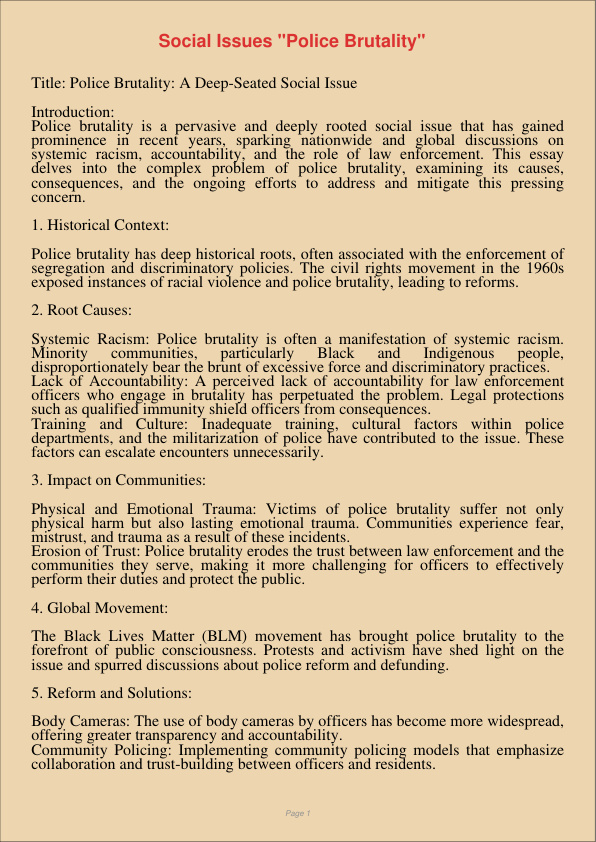
Title: Police Brutality: A Deep-Seated Social Issue
Introduction: Police brutality is a pervasive and deeply rooted social issue that has gained prominence in recent years, sparking nationwide and global discussions on systemic racism, accountability, and the role of law enforcement. This essay delves into the complex problem of police brutality, examining its causes, consequences, and the ongoing efforts to address and mitigate this pressing concern.
- Historical Context:
Police brutality has deep historical roots, often associated with the enforcement of segregation and discriminatory policies. The civil rights movement in the 1960s exposed instances of racial violence and police brutality, leading to reforms.
- Root Causes:
Systemic Racism: Police brutality is often a manifestation of systemic racism. Minority communities, particularly Black and Indigenous people, disproportionately bear the brunt of excessive force and discriminatory practices. Lack of Accountability: A perceived lack of accountability for law enforcement officers who engage in brutality has perpetuated the problem. Legal protections such as qualified immunity shield officers from consequences. Training and Culture: Inadequate training, cultural factors within police departments, and the militarization of police have contributed to the issue. These factors can escalate encounters unnecessarily.
- Impact on Communities:
Physical and Emotional Trauma: Victims of police brutality suffer not only physical harm but also lasting emotional trauma. Communities experience fear, mistrust, and trauma as a result of these incidents. Erosion of Trust: Police brutality erodes the trust between law enforcement and the communities they serve, making it more challenging for officers to effectively perform their duties and protect the public.
- Global Movement:
The Black Lives Matter (BLM) movement has brought police brutality to the forefront of public consciousness. Protests and activism have shed light on the issue and spurred discussions about police reform and defunding.
- Reform and Solutions:
Body Cameras: The use of body cameras by officers has become more widespread, offering greater transparency and accountability. Community Policing: Implementing community policing models that emphasize collaboration and trust-building between officers and residents. Reform of Use of Force Policies: Revising use of force policies to emphasize de-escalation, non-lethal alternatives, and clear consequences for excessive force. Legislative Change: Advocacy for changes in the law to reform qualified immunity and hold officers accountable for misconduct.
- The Role of Civil Society:
Public Pressure: Ongoing public pressure and activism play a vital role in addressing police brutality. They contribute to pushing for accountability, reforms, and changes in law enforcement practices. Community Engagement: Encouraging community members to engage in dialogue with local law enforcement, hold meetings, and provide input on department policies.
Conclusion: Police brutality is a deeply entrenched social issue with a history of discrimination and violence against marginalized communities. Its root causes, including systemic racism, a lack of accountability, and cultural factors within police departments, must be addressed through comprehensive reform and policy changes. The impact of police brutality on communities is profound, creating fear, mistrust, and emotional trauma. However, the global movement for racial justice, alongside ongoing activism, has increased awareness and spurred efforts to reform policing practices. Public engagement, transparency, and legislative changes are crucial in mitigating this pervasive issue and building a more just and equitable society where all individuals can trust law enforcement to protect and serve them without fear of brutality.
「真诚赞赏,手留余香」
真诚赞赏,手留余香
使用微信扫描二维码完成支付
